There was a privately funded reading initiative that made a big difference, among other things.
The Barksdale Reading Institute
There was a privately funded reading initiative that made a big difference, among other things.
Madison Schools don't even come close to having the money the top schools in the Dallas metro do.I think this rating system has a negative impact on the good schools as well. My kids have been in Madison Schools (Madison Central). A schools, 80 percent Level 4 and 5 - that's all good, but they sell themselves short. If the leadership would get serious, Madison schools could be absolutely world class. For some reason they don't want to go from Good to Great. They are happy being one of the top schools in Mississippi and they could be one of the top in the nation.
All the ingredients are there. Great facilities. Great teachers. Great parents. Students who care. They are selling themselves short. I see it in a lot of decisions. For example, they offer 10 or 11 AP courses depending on the year, one of the top in Mississippi. Average schools in Alabama and Tennessee offer 15+. There are only four classes (College Algebra, Art Appreciation, English Comp I and II) for dual enrollment. Top schools in Dallas metro offer 64 hours of dual enrollment.
What's the difference in spending per student between Madison and top Dallas metro publics?Madison Schools don't even come close to having the money the top schools in the Dallas metro do.
1- I am shocked that kindergarten isn't universally public in MS(that's how I read your post). It should be widely available in every public school district in the state.The reason that Mississippi is showing such success is public kindergarten. It moves those kids who come from disadvantaged families to school ready by the first grade. In communities like Tupelo, they go a step further and pick up there students at four-years old.
Not even the NEA? My wife was a teacher, and she was a member of the NEA (National Education Association). She pretty much didn't have any choice, and allegedly they would give legal support in the case of malpractice suits. Fortunately, we never had to see if they really did. But one never knows nowadays.there isnt a teachers union in mississippi. not one at all. nothing that even resembles one.
I wasn’t. Unions have nothing to do with Mississippis success. Neither does MORE money.Don’t try to associate school success measurements with union membership.
Those are way too complex to actually analyze properly and if you do try, then just as many examples will be easily provided to counter.
On a per student basis it probably does. This is Madison vs Frisco. The difference being economies of scale as there's nearly 70,000 students in Frisco ISD vs less than 15,000 in Madison County SD.Madison Schools don't even come close to having the money the top schools in the Dallas metro do.
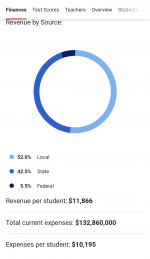
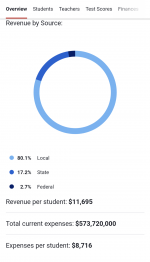
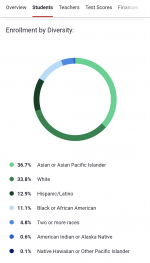
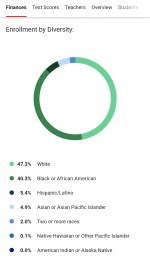
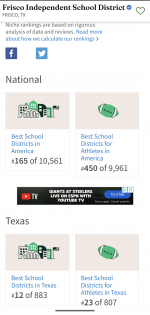
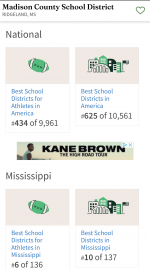
You don't need advanced things for good education. It's great for gifted students to have access to more technology and labs, but you can prepare a good student to go to any school in the country and major in any major and be prepared with nothing but books, pencils, paper, a calculator, protractor, compass, and ruler.It still takes a set amount of money for advanced things to an extent. Madison has way less students. So they don't have as much money.

 www.joannejacobs.com
www.joannejacobs.com
I didn't say it did. You are mostly correct.You don't need advanced things for good education. It's great for gifted students to have access to more technology and labs, but you can prepare a good student to go to any school in the country and major in any major and be prepared with nothing but books, pencils, paper, a calculator, protractor, compass, and ruler.
Mississippi has shot up the rankings mainly by just not being idiotic about teaching. Just teaching reading in a way that we know works rather than use some crackpot idea somebody with a masters in education came up with will move you to the middle of the pack, even with poorer demographics.
I don't think people realize how idiotic our education system is as a whole and how for decades we have mostly been teaching in a way that we know doesn't work because that's the way teachers were taught to do it in college.

Teach the children well: From rural Oregon to Houston, students are learning more
Third-graders at Adrian Elementary School, in the poorest county in Oregon, have the highest reading proficiency scores in the state, reports Steven Mitchell of The Enterprise. Test scores were low before the pandemic in rural Malheur County. But four years ago, the district hired a reading...www.joannejacobs.com
Just good schools? Students and parents make good schools. Schools are at the mercy of the bottom quintile and much of America is as well. They eat up a lot of resources and often remain in the bottom quintile educationally. It's really hard to do much with some of those kids. Americans in the bottom quintile also cause most harm to other Americans, commit most crime and ruin public spaces. Most educated Americans don't want their kids in classrooms with the bottomed quintile, their public spaces ruined by the bottom quintile nor do they want to live in neighborhoods occupied by the bottom quintile. Members of the bottom quintile are more likely to get a pitbull than those outside of it. Sounds harsh but notice how people behave, where they live and the choices they make.The good schools stay at the top because they are the good schools. 25% of the score is improvement. So as long as they dont tank the score just fine.
The improvement score allows everyone else to catch up.
Its really not a hard model to understand. Which why the good schools stay at the top, but the other schools yo-yo between grades on a yearly basis.
Again go look at a so-called good school.. a traditional A school.. and compare it to one that just made that score. Check the ACT scores, the grad rates and all that stuff. You'll see the discrepancy.
i agree. It takes a lot to make a good school a good school.Just good schools? Students and parents make good schools. Schools are at the mercy of the bottom quintile and much of America is as well. They eat up a lot of resources and often remain in the bottom quintile educationally. It's really hard to do much with some of those kids. Americans in the bottom quintile also cause most harm to other Americans, commit most crime and ruin public spaces. Most educated Americans don't want their kids in classrooms with the bottomed quintile, their public spaces ruined by the bottom quintile nor do they want to live in neighborhoods occupied by the bottom quintile. Members of the bottom quintile are more likely to get a pitbull than those outside of it. Sounds harsh but notice how people behave, where they live and the choices they make.
Doesn't matter. Spending has little effect on educational outcomes. Nationally we spend more educating poor blacks and Latinos than we do on high achieving whites and Asians.What's the difference in spending per student between Madison and top Dallas metro publics?
There are benefits to both. On the one hand, societal progress is driven by probably 10% of the population. Less than 1% that are innovative and drive technology/science forward and then probably the rest of the10% that are at capable enough to help implement the ideas/tech created by the smaller percent.i agree. It takes a lot to make a good school a good school.
Which is why I disagree with the scoring model. Its like going to a travel ball tournament and having an A, B, and C bracket and letting each of the brackets call themselves champions... when in reality the last place team in the A bracket would kill the C bracket winner.
Also anyone that thinks teaching to one segment of the school or making one segment of the school more important that the rest of the school (the lower 25% count for more) is really a good idea? Imagine what would happen if we just taught to the upper 25%... people would be livid... but we are totally fine teaching to the lower 25% in Mississippi. Some are even calling it progress.
You just got pwn3d so badly, you didn't even realize itIt still takes a set amount of money for advanced things to an extent. Madison has way less students. So they don't have as much money.
I didnt say it matters.Doesn't matter. Spending has little effect on educational outcomes. Nationally we spend more educating poor blacks and Latinos than we do on high achieving whites and Asians.
Your comment in red is pretty acceptable at the elementary level and even into middle school for many things.You don't need advanced things for good education. It's great for gifted students to have access to more technology and labs, but you can prepare a good student to go to any school in the country and major in any major and be prepared with nothing but books, pencils, paper, a calculator, protractor, compass, and ruler.
I agree with you that spending in general doesn't have a big effect and more spending generally is not good bang for the buck.Doesn't matter. Spending has little effect on educational outcomes. Nationally we spend more educating poor blacks and Latinos than we do on high achieving whites and Asians.
I would differentiate preparation for education versus preparation for a career. Yes, that stuff is great for exposure to a career, but not that important for college with the exception of computer sciences, which I meant to caveat in my first post but forgot as I was typing. I would argue that if you have the time to do it, teaching without tech is actually more effective at education outside of computer science. Maybe also caveat labs for chemistry and biology and physics. Not technically necessary to know the material, but arguably being able to do the experiment and drive reactions is part of chemistry, and of course if you want to be able to actually do anything with biological sciences, the dissections and dna experiences and what not are helpful.Your comment in red is pretty acceptable at the elementary level and even into middle school for many things.
At the high school level though, students can be better prepared if you have subject specific classes that utilize current subject specific equipment and technology to allow students to experience and learn. Additionally, those classes open up opportunities to students by exposing them to job fields that they otherwise have no connection to.
CTE(career and technical education) classes can be for everyone and benefit everyone. Students can take classes on nursing, architecture, aquatic science, civil engineering, graphic design, plumbing, aviation tech, electrical infrastructure, landscaping, CAD, baking and cooking, cyber defense, veterinary services, business law, child development, design and fashion, construction trades, metalwork, automotive fundamentals, and much more.
This stuff exposes kids to future careers and gets them college and trade credit. It introduces kids to valid career paths which may not require a college degree, which is a popular cause to focus on for some adults right now.
Now of course kids can get a good education with 0 digital technology, like you claim. But that doesnt mean that is an effective way to educate teens and prepare them for their futures.
When one school district offers 75 different CTE classes and a 1to1 device program while a neighboring school district offers 0 CTE classes and just a free protractor and ruler, it shouldnt be difficult to see which district parents and kids will want to flock to. And with districts in so many states having to now compete with one another for students due to recent changes to open enrollment laws, no district in their right mind will follow your point.
^ unintended consequence of creating competition in public education- its an arms race to attract and retain students.
You just "pwn3d' yourself, and you don't even know it. His post mostly confirmed my point.You just got pwn3d so badly, you didn't even realize it
Maybe pull your mask down so you can see better?
The unintended consequence I was referring to is the reality that an arms race was created...which costs money and focuses on tech.I don't think that's unintended? That's the primary argument for basically any type of school choice, even when it's just choice between public schools.
Frisco ISD spends all that money on buildings though. They have a dozen 5a high schools, 19 middle schools, and 77 elementary schools.It still takes a set amount of money for advanced things to an extent. Madison has way less students. So they don't have as much money.
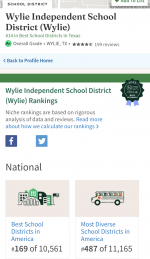
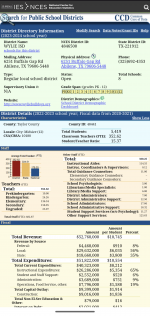
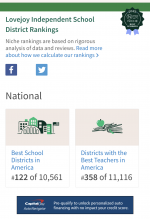
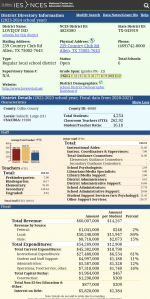
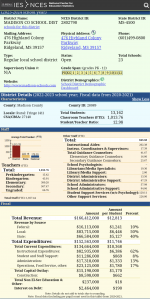
I went 35 years ago and the ACT was just something you took if you were going to college. Not really discussed, just an announcement about when the local JUCO would hold the exam.Back in the day?
I took the ACT over a quarter century ago and it was common to take it multiple times even back then. I actually fought my parents hard to NOT take it again because I scored high enough. It was commonplace to take it multiple times- Spring Jr year, Fall Sr year, and even Winter Sr year if needed.
Also, schools can choose whether or not to accept a superscore. If a university thinks it is helpful to accept superscores when considering applicants, then they can accept em. If a university thinks superscores are BS, then they can stick to only accepting the full test score.
Point being, schools account for this and it really isnt a big deal or evidence of the watering down of education standards.
If you score a 30 on a section, take it again and get a 33, and they take it once more and get a 31...you really dont think the person has demonstrated that they know enough to earn a 33? I mean, they did it so its sorta tough to claim they didnt.
Almost nobody takes the test 8-10 times because the average for those who take the ACT is about 1.5 tests per person(projection based on changes between 2009 and 2015). But go ahead and use the extreme rare example to support your argument.
Lastly, I am not assuming people are scoring high enough on the sections to be proficient. If my comments eluded to that, my bad I guess, but it definitely wasnt something I was basing my comments on.
I had family that went to Wylie, been there. All you have to do is look at the place and it's not hard to see why it out preforms Madison. Socioeconomic status is and always will be the best predictor of student performance when it comes to schools as a whole. It's been pointed out repeatedly in this thread that it costs more to educate the farther down the scale you go. Per pupal expenditure should not ever be used as the main ruler for school efficiency. Money matters, and it really matters the lower you go. I actually taught for a short while. It takes more investment, and not just in money, to reach the low end. Just throwing money at a bad school won't fix it.Frisco ISD spends all that money on buildings though. They have a dozen 5a high schools, 19 middle schools, and 77 elementary schools.
Here are some smaller districts in the Dallas area that actually perform as well or better than Frisco.
Wylie ISD is spending less per student as Madison with less than half as many students. Ranked #169 (TWSS) in the country.
View attachment 681034
View attachment 681037
View attachment 681042
Here's Lovejoy ISD. A small but excellent district right between Frisco and Wylie. A third the size with a little more spent per student... But very highly regarded public education. Basically in the top 1% in the country for public schools.
View attachment 681040
Here's Madison County for reference. Still a great score, but $ isn't the difference... Demographics are though.
View attachment 681047
View attachment 681045
I think that's because the entire point of school choice is that central planning is hard. Most people who would say things like "students will win when schools compete" would think it would foolish of them to think that they could predict exactly how that would playout across a state or country. I'm not shocked schools would try to tout their technology to compete. Depending on the community, that seems like an obvious option along with focusing on ACT/SAT scores and touting college readiness, or focusing on Votech and career readiness, or even just touting a safe, disciplined environment if that's not something a lot of schools in the area can offer.The unintended consequence I was referring to is the reality that an arms race was created...which costs money and focuses on tech.
I say that because nobody I have ever spoken with who has been in favor of turning public education into a competitive landscape has cited 'increased spending on more and more advanced tech' as a reason for them thinking the way they do.
Well at least you now see the unintended consequence I was referring to.I think that's because the entire point of school choice is that central planning is hard. Most people who would say things like "students will win when schools compete" would think it would foolish of them to think that they could predict exactly how that would playout across a state or country.
Yes, it is an obvious option for schools to focus on, in addition to those other things.I'm not shocked schools would try to tout their technology to compete. Depending on the community, that seems like an obvious option along with focusing on ACT/SAT scores and touting college readiness, or focusing on Votech and career readiness, or even just touting a safe, disciplined environment if that's not something a lot of schools in the area can offer.
I agree money matters, especially if you don't have a minimum amount. But it doesn't take mid performing schools to the top. Leadership and demographics (not necessarily just race but income, parents education and values etc) mean more.I had family that went to Wylie, been there. All you have to do is look at the place and it's not hard to see why it out preforms Madison. Socioeconomic status is and always will be the best predictor of student performance when it comes to schools as a whole. It's been pointed out repeatedly in this thread that it costs more to educate the farther down the scale you go. Per pupal expenditure should not ever be used as the main ruler for school efficiency. Money matters, and it really matters the lower you go. I actually taught for a short while. It takes more investment, and not just in money, to reach the low end. Just throwing money at a bad school won't fix it.
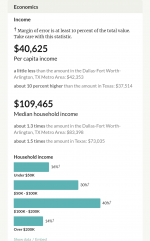
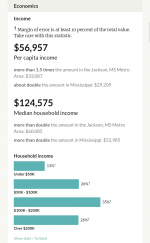
Like I said, I had family in Wylie for a while. I know about the place. It still doesn't have some of the socioeconomic factors Madison has to deal with, as you pointed out.I agree money matters, especially if you don't have a minimum amount. But it doesn't take mid performing schools to the top. Leadership and demographics (not necessarily just race but income, parents education and values etc) mean more.
Case and point.... Wylie doesn't have Madison money. I lived and worked in DFW for nearly 15 years. I lived in Frisco (near Wylie but bigger, nicer, more affluent) before I moved and while there I spent a lot of time on residential and commercial construction projects in Wylie... Wylie is not anywhere near as nice as Madison. Not even factoring in the higher cost of living in DFW (20% higher when compared to Jackson Metro) Madison has significantly higher income than Wylie.
Madison is much nicer than Wylie. It's where the less educated and less affluent folks live in the North Dallas suburbs. In fact, as far as DFW suburbs rankings it doesn't make that top 30 according to Niché. But the demographics are better than Madison in other ways and Wylie does something unique that most districts skip... Character education.
Wylie has a lot more blue collar workers than most of North Dallas. The school district leans into it and helps develop respectful and well behaved kids. It's called the "Wylie Way" and is very successful and costs next to nothing.
Everyone should be doing this.
The Wylie Way
Wylie income
View attachment 681280
Madison income
View attachment 681281
Well at least you now see the unintended consequence I was referring to.
Your comment highlights a real unfortunate reality for those who have taken an axe to a problem that needed a scalpel- not only did they not predict exactly how it would play out, they didnt even attempt to predict how it would play out. It is unconscionable to support such drastic changes to state laws without having defensible information showing likely changes.
I mean, it's just not unrealistic at all. Unless you are going to school for computer science, the technology part is relatively easy. Even in engineering, give me a student that can do the math and physics and understand it and also apply logic and if they have been neglecting learning the latest technology, it will be a breeze for them to catch up. Again, I'm not claiming that not using technology is optimal, but it's just not necessary to provide a education that prepares somebody for higher education, again with the exception of computer science.^ I know multiple state legislators in my state who are guilty of this and have read countless articles analyzing same/similar changes in other states that have quotes from stakeholders that complain about the same thing. My comment above is not simply a guess of mine or me taking a local experience and projecting it out.
None of this should be surprising since so many legislatures have used the exact same templates provided by interest groups/'think tanks' when crafting the laws.
Yes, it is an obvious option for schools to focus on, in addition to those other things.
It also highlights how completely unrealistic your claim is that a ruler, compass, and calculator will get kids into any college in the country and have them prepared for success.
Well, you don't have to have a school district try it. And you don't even have to have a school try it. It can be mixed in as an option in an individual school. But I think you're underestimating the likelihood that it will be tried. I'd be surprised if it isn't being done right now. It's not a new thing. I had math teachers that did not want us to use calculators and math teachers that liked to have us do some tests without calculators and some tests with a Ti-eightywhatever it was when I was in high school and college.That hypothetical will always be a hypothetical because school districts wont ever try in a world where public education has been thrust into a poorly formed free market where schools compete for students. Its just a totally worthless hypothetical claim since it wont be tried.
Ok, I think this is an instance where we there is misunderstanding at the most basic of levels and its causing confusion.Why is having schools focus more on technology unconscionable?
This is accurate. If you know how to work the system you can inflate you can make your test scores seem impressive. Moss Point was an A rated school last year. A. Give me a break. With concordance, there's so many ways now you can offset things to make it look impressive and inflate your data. There's a system and everyone is learning how to beat it. Graduation numbers are also getting boosted because of MAAP-A, which is the state tests for self-contained, special needs students. If those students pass their test, they count towards the graduation numbers.Honestly.. and no one really wants to hear this.. the state has continued to make the target easier for students/teachers/schools to hit.
The education really hasnt gotten any better, nor have the schools. They've made a system where everything scores higher to make things seem better than they are. Smartly so, they've realized that bad scores give us a black eye, so they've made it easier to attain better scores.
Even the ACT now has a super score, where you take the highest you've scored in each section, add it up, and make that your ACT score.
Ok, I think this is an instance where we there is misunderstanding at the most basic of levels and its causing confusion.
I dont have a problem with schools focusing more on technology and I didnt say that is unconscionable.
What I said is unconscionable is that legislators support such drastic changes without having valid info that shows what likely results will come from those changes.
Again, this is the logical result of legislators proposing and supporting drastic changes that they didnt write and dont fully understand because interest groups/'think tanks' are who wrote the laws and pushed them on legislators to pass.
money doesn't matter nearly as much as people want it to.On a per student basis it probably does. This is Madison vs Frisco. The difference being economies of scale as there's nearly 70,000 students in Frisco ISD vs less than 15,000 in Madison County SD.
Madison County SD
View attachment 678636
Frisco ISD
View attachment 678637
***The Frisco data is from 2020-2021 so the COVID closings saved a lot of dollars and that's why revenue and expenses don't match.***
The reality is the only needle mover in public education is demographics. But that's touchy. Income, race, and family educational attainment are big needle movers.
The biggest difference in the results between a Frisco ISD and a Madison County SD is the fact that 35% of Frisco ISD is Asian and those kids lift the rest of the district up. Madison doesn't get that.
Frisco ISD
View attachment 678648
Madison County SD
View attachment 678649
Results say both districts are in the +/- 95th percentile
View attachment 678650
View attachment 678652
Are the numbers normalized to ensure only the same required services are being compared?money doesn't matter nearly as much as people want it to.
There are lots of school districts toward the top of the grades/scoring and toward the bottom in Dollars per student
All i know is based on multiple websites/sources that i assume are being consistent show many under performing districts with a higher dollar per student fundingAre the numbers normalized to ensure only the same required services are being compared?
The District my kids attend shows cost per student is like 25% higher than neighboring districts. Part of that is because the District offers way more specialized classes at the 9-12 level, but a lot of the difference in cost per student is just that the District pays for many services out of pocket that the neighboring districts receive from Area Education Agencies.
District A - $12,300 per student.
District B = $10,000 per student plus AEA spends $2,500 per student.
^ In this hypothetical, which is based on reality, the District that shows as spending less per student is actually spending more.
I am sure you dont know, or if you genuinely know(vs just claiming it), you know for a specific example and dont know at a wider level. I am just offering up the info above as context for how some school costs are reported. There is often a story behind the numbers that explains a lot.